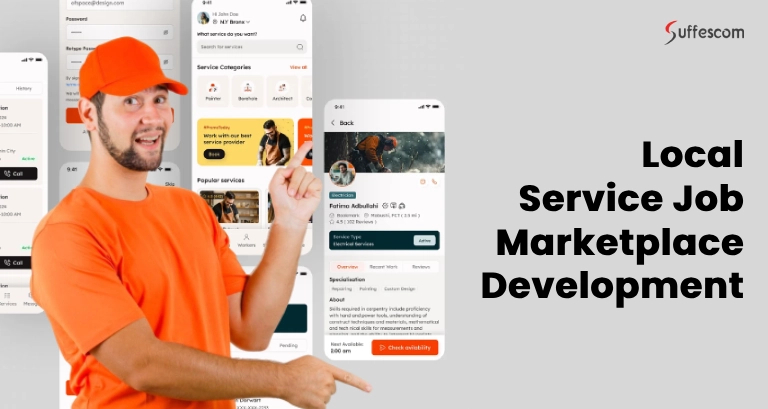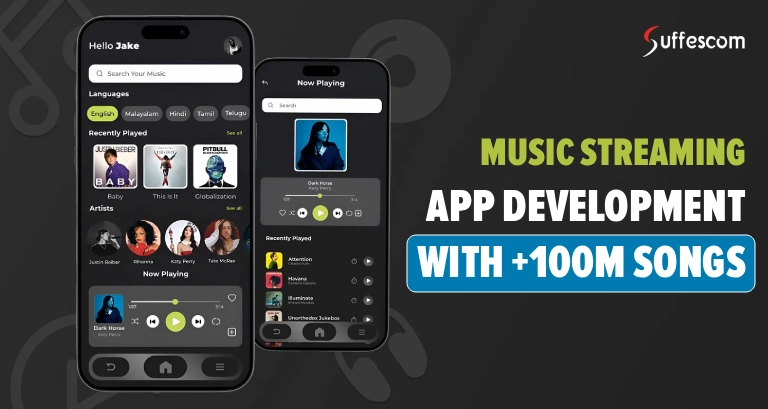Local Service Marketplace Development Solutions for Modern Businesses

Today's world is constantly moving forward with platforms that offer services directly to the customer's home. Businesses across the globe have shown an increased demand for investing in this successful venture, offering a wide range of services, including everything from skincare to plumbing, gardening, and more.
There are several strategic benefits associated with local service marketplace development. These platforms solve real, local problems by aggregating trusted service providers on a uniform platform, allowing customers to search, compare and book services quickly. The inclusion of ratings, reviews, and verified credentials builds exceptional trust and transparency.
Build local service marketplace for your business and expand your reach in the international market. There is absolutely zero operational cost in terms of expansion, and on the contrary, it helps generate massive money through different monetization strategies.
Highlights of the Service Marketplace Platform
By 2034, the worldwide Hyperlocal services are anticipated to reach $56.51 billion, with an expected CAGR of 13.2%. Moreover, local marketplaces offer a community and economic engagement, allowing startups and mid-scale businesses to drive growth and build deeper connections with the users.
Based on the facts and figures, there is a significant scope for market development due to the increased customer preference. The world is shifting towards the gig economy, compelling entrepreneurs to view local services marketplace development as a key driver of scalability and earning massive profits.
Local Professional Finder Platform Development Solutions We Offer
1. White Label Local Service Marketplace
The pre-built solutions help businesses achieve quick market entry without incurring significant time, cost, and infrastructure expenses. The aim is to help enterprises focus on core business operations instead of technical development.
2. Custom Local Service Marketplace Development
Build a custom platform from scratch, integrated with unique functionalities, making it distinct. It requires deep market research, an understanding of the niche, thorough testing, and defining the business model; therefore, it takes more time and costs.
3. MVP For Local Service Marketplace
The prime objective with MVP app development is to deliver the essential features from the buyer and seller's point of view. In this case, the user feedback is gathered along with business model validation before scaling up.
4. Startup Product Development
Initiates ideas into commercially viable services and products, leveraging unique techniques to offer superior solutions. Common business challenges, such as product redevelopment, product design, prototyping, and clear frameworks, are addressed.
Looking for a Local Service marketplace development company?- Partner With Us!
How to Build Local Service Marketplace?
1. Market Research
Before any platform development, local market demand for certain services and the types of services like home cleaning and general housekeeping, plumbing services, tutoring, beauty services, needs to be met. Conduct user interviews with potential users and service providers to comprehend their pain points, preferences, and willingness to think about a digital marketplace.
2. Defining Business Model
Once the research is complete, it's crucial to make the marketplace unique and distinguish it locally. Define the standard approaches that include commission on transaction platform fees, subscription fees for providers to list their service products, and featured listings, among others. By clarifying your value proposition and business model early, you can focus your platform on a pathway for features and marketing campaigns.
3. Platform Design
When creating a local marketplace, geolocation is an essential feature. People expect users to be able to easily find service providers nearby. Include the components users want to see: service providers' profiles, service categories, real-time availability or calendars, secure payment systems, and more.
4. Build Core Features
Deciding on the tech foundation of the local service marketplace is challenging. Building a digital marketplace involves determining your tech foundation. MVP app development serves as the stepping stone in this case, enabling the testing of the platform's core functionalities, including registration, search, booking, payments, and ratings/reviews.
5. Launch & Marketing
This phase includes launching and then further promoting the marketplace aggressively through social media ads and partnerships with local businesses. It involves highlighting the benefits and special offers that fetch maximized user attention.
Local Professional Finder Platform Development for Diverse Businesses
1. Local Community Service Platform
Acts as a digital hub where residents of a particular neighborhood or region find and offer services. Such platforms encourage localised engagement by connecting service providers like handymen, tutors, cleaners, or pet sitters, etc.
2. Mom Stay-At-Home
Taps into the talent pool of stay-at-home mothers who are available to offer flexible services from home. These services include childcare, home-cooked meals, tutoring, and even admin support. Such a business model allows moms to earn income without depending on a regular full-time job.
3. Babysitting Platform
Professional finder marketplace development in babysitting scenario specializes in connecting parents with trusted, nearby babysitters. These are focused on allowing users to view sitter profiles, reviews, availability, and rates. It involves verification and background checks to build trust.
4. Nannyfinder Marketplace
From a local service marketplace perspective, it helps families find qualified, experienced nannies who fit their schedules, child-rearing preferences, and values. Professional finder marketplace development for this business helps with a secure payment system and legal compliance, making the entire experience seamless.
5. Pet Care Finder Platform
Allows pet owners to connect with nearby professionals and enjoy services. From playing to grooming, training, etc, the pet sitters are hired based on reviews and ratings, ensuring top-notch care with a personalized touch.
6. Dog Walker Finder
A dog walker finder app includes GPS tracking, recurring booking options, and real-time updates. It is a highly focused local service niche that helps busy pet owners find reliable people to walk their dogs in their local region.
7. Plumbers Finding Marketplace
The platform allows homeowners to quickly hire plumbers, and offers scheduling tools, secure payments, and verified customer feedback, streamlining the entire process nearby without the hassle of cold calls or unreliable directories.
Local Service Marketplace Development: Must-Have Features Building Engagement
1. Search & Filter
Helps find service providers based on their location, category, pricing, and availability. The users input their requirements and get the desired results instantly in just a few taps. The results are refined depending upon the ratings, background verification and the hourly charges.
2. Booking Attribute
Helps users book their appointments in real-time by selecting a specific time slot. The service providers confirm the availability, and schedules sync with users' calendars.
3. Profile management
Manages both users' and providers' profiles, allowing customisation, updation and proper control over the personal settings. Users can post requirements and manage their billing history, while providers use dashboards to view inquiries, earnings, and the status of background checks.
4. Messaging & Notifications
In-app chat systems allow direct communication between clients and providers. Users receive real‑time updates on booking status, provider responses, reminders, and promotional notifications, all contributing to engagement and clarity.
5. Analytics & Admin Dashboard
Admins use dashboards offering real-time analytics on platform performance, like total bookings, traffic, most popular services, provider activity, and commission tracking. Providers can also see enquiry status and conversion metrics.
6. Onboarding & Verification
Providers undergo a guided onboarding process that may include requirements like ID, GST or license documentation, KYC checks, and optional premium upgrades. Verified providers receive badges or enhanced visibility to build trust.
7. Feedback
Helps users evaluate providers via ratings, written reviews, and profile feedback. This builds trust, improves matching quality, and helps users make informed hiring decisions.
8. Social Integration
Users and providers can sign up via social platforms, share their listings or reviews, and invite friends via referral links or networks that boost organic growth and engagement.
9. Multilingual Support
Cater to a diverse audience by offering the interface and content in multiple languages, where users may speak different native languages. This feature aids in building interaction, improving accessibility to reach a wider audience, and blurring geographical boundaries.
10. Payment Methods
Provides multiple payment modes, delivering a trustworthy transaction experience. In Local services directory development, this attribute supports various options like credit/debit cards, digital wallets, and bank transfers. Secure payment gateways like PayPal and Braintree make secure transactions and protect user data.
11. Order Management
Helps customers track, manage, and update service requests in real-time. This includes order placement, scheduling, and status updates. Efficient order management streamlines business operations and ensures optimum transparency between both parties.
Build local service marketplace and gain high ROI
Top 4 Local Service Job Marketplace Platforms Globally
1. Bark
Bark is one of the perfect professional marketplaces that offers services like home & garden, health & wellbeing, weddings & events, business services, lessons & training, etc. The platform precisely gathers detailed information about customer preferences to meet their needs.
2. Nextdoor
Build an app like Nextdoor with cutting-edge features that serve users, service providers, community organizations, etc. The platform encourages information sharing, offering local service suggestions leading to community engagement.
3. Airbnb
Build an app like Airbnb that connects people looking for accommodations with the property owners. This P2P model allows listings that range from individual homes to apartments, with emphasis on the ratings that build trust and transparency.
4. TaskRabbit
Create your local service job marketplace like TaskRabbit, and offer a diverse range of online handyman services to users. The multi-vendor service includes home cleaning, plumbing, beauty &salon, meal delivery, private nursing, event planning, etc.
How Does the Local Service Job Marketplace Help Make Money?
1. Commission Fees
The marketplaces' owners charge a significant amount of fees from the service providers for every completed task.
2. Advertisements
The platforms display paid ads promoting third-party products and services that help in generating revenue.
3. Subscription Plans
The availability of the premium features and access to diverse local services are gained through paid membership plans, for which certain fees are charged.
4. Listing fees
The service providers pay a specified amount to the platform to list their wide range of services, which could be a flat fee, a percentage-based fee, or tiered listing fees, etc.
What are the Future advancements in Local Services Directory Development?
Local professional finder platform development uses advanced technologies that maintain scalability and amplify user satisfaction. The most significant one is AI and ML, which elevates user experience through smart recommendations, dynamic pricing, and automated customer support via chatbots.
Blockchain can definitely be used in the forthcoming times. The smart contracts maintain transparency and robust security, making transactions tamper-proof. This emerging technology can address various challenges like decentralized identity management, streamlined payment system, automatic dispute resolution, tracking services and ensuring accountability at every stage.
How Much Does it Cost to Build a Local Service Marketplace?
The professional finder marketplace development cost ranges from $8000-$25000, depending on the client's needs and project complexity. However, the prices can vary due to the project requirements. There are ample factors that affect the local services marketplace development cost; some of which are listed below;
- Necessary Integration
- Location Of The Development Firm
- Security & Data Privacy
- Advanced Features Addition
- Complexity Level
- UI/UX Design
- Development Team Expertise
- Platform and Device Compatibility
- Maintenance and Updates
- App Store Optimization
Realize Your Idea to Build Local Service Marketplace into Reality with Suffescom!
Choosing the best partner for your local services directory development is important for amplified business success. Our white label community platform solution stands out in the market due to its unique, scalable, and user-friendly design, which caters to the specific needs of your business.
We don't just build software, we build solutions that solve real-world problems. We create top-notch mobile-first designs with secure architecture, helping businesses gain an edge in this fast-paced world.
Our commitment to work sets us apart from the rest. Suffescom is the top technology partner when it comes to driving growth and scalability. Whether you’re a startup or an established enterprise, choose us to bring your local service marketplace idea to life with innovation, reliability, and unmatched quality.
FAQs
1. How much time does it take to build local service marketplace?
Local services marketplace development time is 3-4 weeks, based on the project requirements.
2. How to find the best local service marketplace development company?
Conduct online research, verify the testimonials, look for the technical expertise, and check their reputation on reputable platforms. Follow these steps and make a decisive decision to hire a trustworthy local service marketplace development company.
3. Which tech stacks are used in local services marketplace development?
React Native, Flutter, Django, Java, MongoDB, AWS, Node.js, OAuth 2.0, and Docker are among the popular tech stacks used.
4. Can I customize the local service job marketplace?
Yes, the platform is open to personalization be it interface, features, etc.
5. How can I start a local service marketplace in minimum time?
Pick your niche, build a platform with superior features, set up service provider and customer onboarding, allow payment, scheduling and finally promote to gain user attention.
6. What features should a local service marketplace platform include?
Search & filters, ratings & reviews, push notifications, admin dashboard, and booking system are the popular features integrated within the platform.
7. What is the local service marketplace business revenue model?
Commission fees, listing fees, subscription plans, and advertisements are the typical ways to earn money.
8. How can I integrate AI into my local service job marketplace?
AI can be integrated within the platform by defining objectives and use cases, data preparation and management, building & training a custom AI model followed with monitoring and evaluation.







